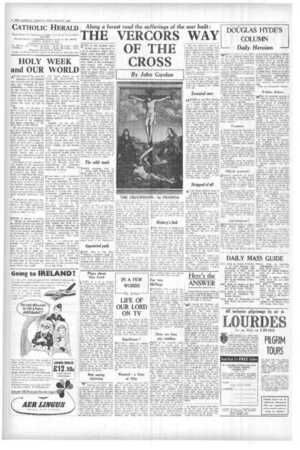Page 4, 23rd March 1956
Page 4

Report an error
Noticed an error on this page?If you've noticed an error in this article please click here to report it.
Tags
Share
Related articles
Singer Takes Refuge With Nuns
The Miraculous Medal Of Paris
Vietnamese Missionaries
August And The Assumption
DOUGLAS HYDE'S COLUMN
Daily Heroism
WHEN I called at the office of the Catholic Relief Service in the Rue du Bac, Paris, one day last week, I was reminded once again of the great generosity of America's Catholics.
The latest project on which the director, Mr. McCloskey, and his team are working is a scheme for bringing financial aid to povertystricken priests. This year they will distribute sonic 30,000 dollars — the result of collections in the U.S. — among priests in various parts of the country. Twenty four thousand dollars will go as gifts to needy French priests, the remainder to refugee priests now in France. Similar schemes arc operating in Italy and other parts of the Continent where the poverty of the clergy is exceptional.
Some figures Mr. McCloskey gave me about priests' incomes are revealing. Outside Paris, he says, the clergy average less than 6.000 francs (something less than £6) total income her month. From 3,000 to 3,500 is basic income, the rest is made up from gifts and Mass stipends.
Vocations
LATEST figures for vocations in 1– France, which Mr. McCloskey had just received show that outside one or two notorious black spots the number of priests is, after the difficulties of the war years, now steadily rising almost everywhere.
One of the black spots is Marseilles; there the number dropped by 200 from a total of 500 in the eight years from 1946 to 1954. In the same period the Paris total rose by 100.
In Brittany, where the number of priests had by the end of the war reached an all-time low, the gains are terrific.
Official generosity
FRANCE continues to benefit considerably by official U.S. Generosity, too, Two thousand tons of food is on the way, a large proportion of which will be distributed by N.C.W.C. Relief Services.
The same agency had received from Catholic sources more than 150,000 lbs. of clothing and shoes this year for distribution to refugees and other needy people in France.
Mr. McCloskey has good reason to know the generosity of his own people. And in passing on the fruits of that generosity he has come to know the extreme poverty which exists in France today.
And tomorrow
DURING a brief stay in London, Fr. Harold Rigney, S,V.D., who for four years and two months was a prisoner of the Chinese Communists, looked me up. Fifty-five year old, bearded Fr. Rigney was Rector of Fu Jen Catholic University, Peking, at the time of his arrest. The university, with its 2,500 students, is now under Red control,
Fr. Rigney paid warm tributes to the heroism of China's Catholic laymen and the goodness of the Chinese nuns, some of whom took enormous risks in helping him when he was in jail. But he looks to the future with apprehension.
There are, he says, 160 million children below 11 years of age in China today. Each one is being
subjected to an unceasing battery
of propaganda, mind-moulding
and corruption. How can they escape becoming indoctrinated with atheistic Communism, he asks,
They are tomorrow's citizens.
Whither Malaya
WILL the promised passing of political power by Britain to the people of Malaya bring to an end the threat of Communism there Certainly it will rob the Communists of one of their main assets by cutting the roots from under the anti-colonialism which they use wherever they find it.
But poverty, which they also exploit, will still be there, even though by Asian standards Malaya is wealthy. And, presumably, much of their future propaganda will be designed to prove that independence is a myth and that the country is still in the pockets of the British imperialists. Thus will they aim to keep alive the old anti-imperialism.
At this moment the Communists of Malaya are on the run. Both militarily and politically they are defeated. Whether their defeat is final remains to be seen. My guess is that they will switch to normal Communist activities in the towns, whilst simultaneously re-grouping their fighting forces in the deep jungle country north of the border. Seen from the air it appears perfect for their purpose.
The very essence of guerilla warfare is that you can take crippling defeats and still come back another day to fight again. That is a lesson every Asian Communist long ago learned from Mao Tse-tung, when he abandoned the great areas over which he had roiled for years in the South, set off on the "Long March" to the North with his followers, and started all over again.
J. B. Perry Robinson, in a very timely book which has just appeared, "Transformation in Malaya" (Seeker and Warburg, 18s.), takes a different view. He believes that the emergency in Malaya is at an end and that the' way is now clear for peaceful progress. His descriptions of the way in which this situation has heen reached make interesting and useful reading, and anyone who wants to get the background to current Malayan developments should put this book on his library list.
I hope that Perry Robinson is right in his belief that the Communist danger in Malaya is past, and that I am wrong. But I still think that we should he ready to see Malaya once again confronted by a serious Communist threat soon after the first enthusiasm for self-determination has died down,
blog comments powered by Disqus









